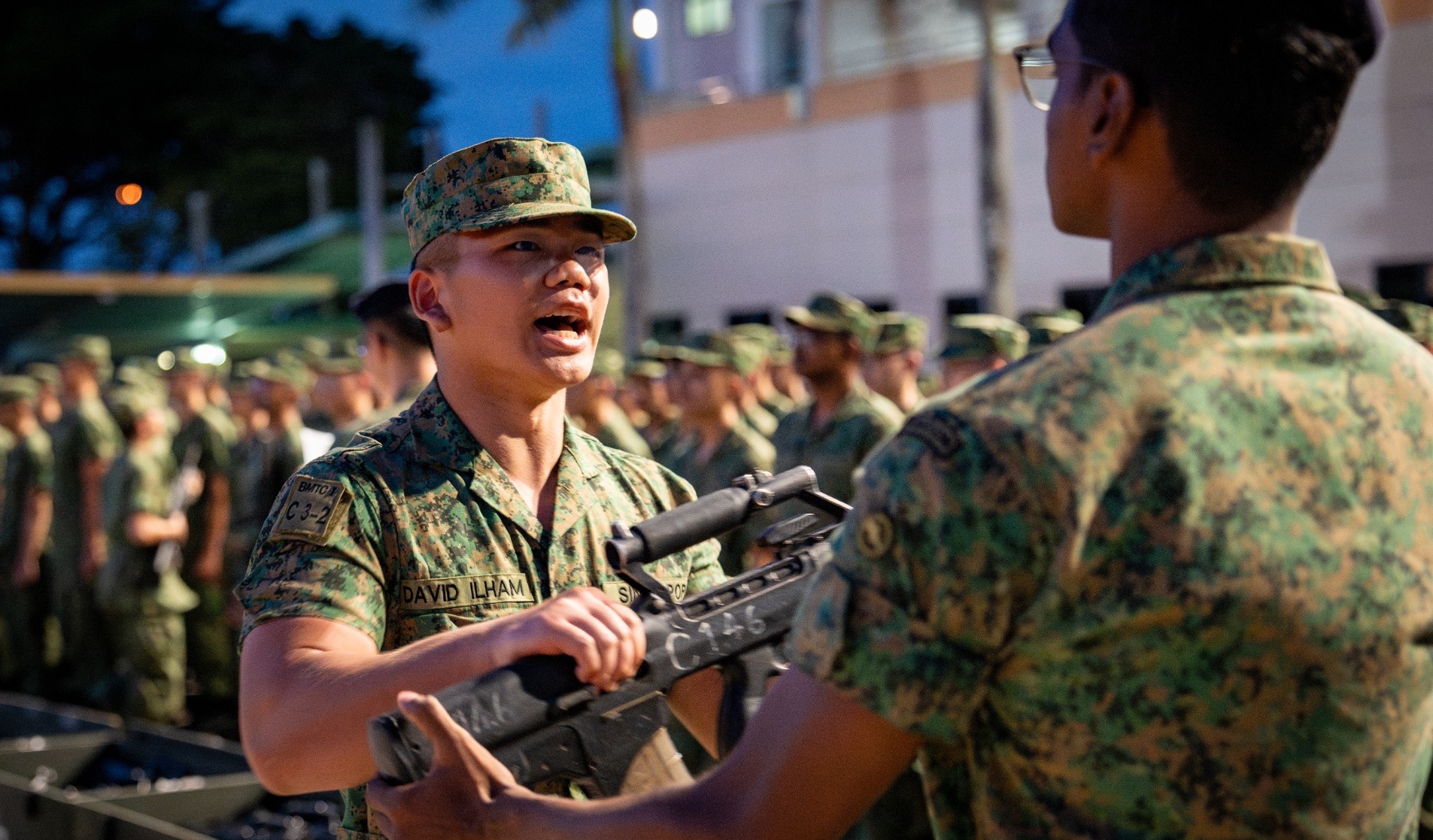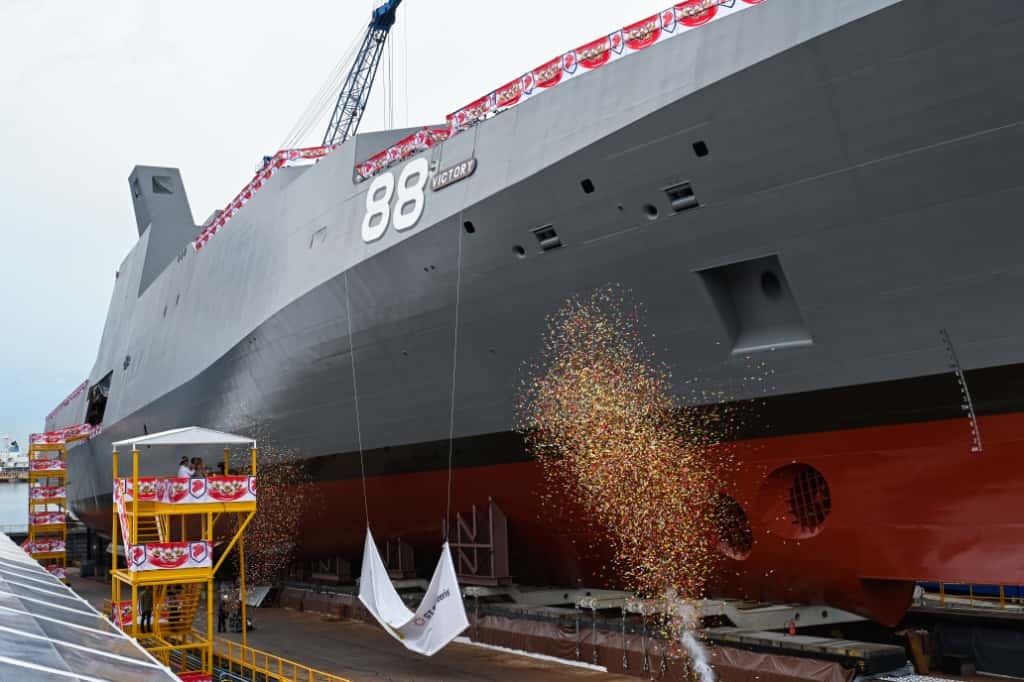MILESTONES
BEST FIGHTER SQUADRON: 143 SQN's WINNING EDGE
22 Jun 2021
One of the best feelings is to receive good news, especially during tough times. Imagine the elation of 143 Squadron (SQN) when they found out that they had won Best Fighter Squadron while undergoing an overseas detachment training.
/22jun21_news3_photo1.jpg?sfvrsn=503764_2)
/22jun21_news3_photo1.jpg?sfvrsn=503764_2)
This is 143 SQN's fifth award, and second consecutive win in the Singapore Armed Forces' Best Unit Competition.
"We received the news of our win while we were here in Guam! It's motivated the squadron to train even harder (and) remain focused on the pursuit of excellence to train safely and effectively, and fulfil our duty of defending Singapore's skies," said Commanding Officer (CO) Major (MAJ) Norman Teo.
/22jun21_news3_photo2.jpg?sfvrsn=fb86a5f6_2)
The squadron, which operates the F-16 fighter jet, is currently halfway into their two-month training. What makes being away from home harder for the servicemen are the strict safe management measures they had to adhere to.
Military Expert (ME) 3 Donus Hoo, who has been in the squadron for 18 years, was very happy to see the squadron achieve victory again.
"In the last five years, we've won three times. It's a strong affirmation of the squadron's hard work and dedication; we've been working tirelessly through the year to meet training requirements and operational demands," said the Air Force Engineer.
PIONEER catches up with MAJ Teo, ME3 Hoo, F-16 pilot Lieutenant Wan Kean Sing and Air Operations Specialist (AOS) 3rd Sergeant (3SG) Ng Wei Liang to find out what it takes to be a winning fighter squadron.
/22jun21_news3_photo3.jpg?sfvrsn=86bba58_2)
1) Be highly adaptable
Remaining operationally ready amid a pandemic has not been easy for the squadron, especially since it is a Critical Operations Unit.
"If one person is down, it will compromise the whole unit. (On top of) adhering closely to the national safe management measures, we also introduced additional measures within the unit, which required the personnel to make adjustments to their lifestyle," said MAJ Teo, 37.
One such measure was having servicemen isolate from their families and stay in base for long periods, which has been put in place since the start of the pandemic.
/22jun21_news3_photo4.jpg?sfvrsn=27552af_2)
LTA
Wan, 26 recalled the challenging early days: "It was difficult to adapt
at the beginning, but now we've adjusted to the new measures. It's
important for us to be able to react quickly to the ongoing COVID-19
situation. All of us are in this together and we are committed to the
same cause."
2) Stay resilient and keep training hard
Despite the ongoing pandemic, the squadron has gone ahead with the detachment training in Guam. They will spend two months training with their F-15SG counterparts from the Republic of Singapore Air Force to hone their operational and tactical readiness.
This is to ensure that the squadron continues to maintain its combat edge in defending Singapore's skies.
"Fighters perform a critical role in Singapore's air defence 24/7. This air defence role never sleeps, regardless of COVID or no COVID. This is a mandate entrusted on us and we cannot afford to fail," said MAJ Teo.
/22jun21_news3_photo5.jpg?sfvrsn=8b4ad2f8_2)
This is why the Guam detachment is important to the squadron, he explained. "(Due to airspace constraints here in Singapore,) we constantly need to leverage high-end training opportunities overseas…to sharpen our combat edge.
"Here in Guam, we can have a sizable deployment with multiple platforms. This enables us to train in a realistic and complex environment, and we can focus on all the technical and operational competencies and sharpen our skills."
LTA Wan agreed: "We can work on different types of mission complexity and different numbers of assets involved. It brings our training up to the next level, compared to what we can do in Singapore."
/22jun21_news3_photo6.jpg?sfvrsn=af92308b_2)
3) Have strong family support
Being away from family for overseas training is never easy. This time around, the squadron's two-month detachment training in Guam was made even more difficult with the strict safety measures in place.
"Already when we were (isolating) in Singapore (during the Circuit Breaker period), due to the limitations to movement, our families had to be more independent in our absence," said MAJ Teo, who is married with a seven-year-old daughter.
Which is why the squadron agrees that having a highly supportive and understanding family is crucial to the success of their training and operations, said ME3 Hoo.
To give his loved ones peace of mind back home, the 47-year-old father of four keeps them up to date regularly. "Before my detachment, I explained the situation to my family. While overseas, I communicate with them daily. This way, I know how they are getting along and they know how I am doing out here," he added.
/22jun21_news3_photo7.jpg?sfvrsn=a4ea1d35_2)
As for young airman 3SG Ng, 21, regular calls home give his parents peace of mind: "I video-call my parents to update them on my health. With the safety measures in place, they know that we are in a safe environment and are taken care of."
MAJ Teo expressed his gratitude the families of his team: "I'm very thankful, not only to my own family, but the servicemen's families who are our pillars of support and understand the importance of our roles and duties, regardless of whether we are in a pandemic or not."
/22jun21_news3_photo8.jpg?sfvrsn=7ab180b3_2)
4) Have a "Secret Weapon" – an Outstanding Serviceman of the Month
Outstanding Serviceman awardee 3SG Ng was due to complete his National Service (NS) in May, but chose to extend his service by three months so that he could join his squadron for training in Guam.
"One of the reasons is that I wanted to learn how the pilots carry out their training overseas. It's been a new experience for me, working in a foreign airbase, meeting the pilots and seeing the differences between training in Singapore and overseas."
As an AOS, his responsibilities involve assisting in the squadron's operations, such as booking airspace for training and compiling pilots' flying hours.
Said the April 2021 winner of his award: "I'm very thankful to my CO and Officers Commanding for nominating me. The journey hasn't been easy, but I'm grateful to them for acknowledging my efforts, positive attitude and overall performance in the squadron."
ALSO READ IN MILESTONES

Answering the call to defend Singapore
21 Jan 2026
The Weapon Presentation Ceremony represents a powerful moment when recruits are entrusted with their rifle and begin carrying the weight of the nation’s defence.

Navy launches 1st Multi-Role Combat Vessel
21 Oct 2025
The Multi-Role Combat Vessel will function as a mothership for the command and conduct of unmanned naval operations.
-dsc_2181.jpg?sfvrsn=cf9c6464_2)
What you need to know about the new CMPB
14 Oct 2025
The new Central Manpower Base (CMPB) at Bukit Gombak officially opened its doors on 14 Oct, welcoming pre-enlistees, servicemen and the public alike to a state-of-the-art, one-stop hub for all things National Service (NS).


